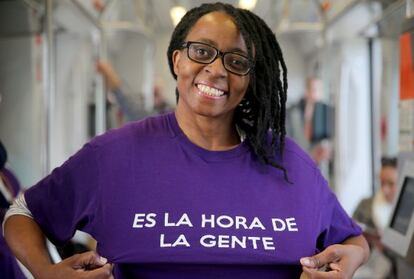Immigrants remain mostly invisible to Spain’s political parties
A Podemos candidate could be the first black person to sit in Congress after Sunday’s vote

Rita Bosaho was born in Equatorial Guinea in 1965. She is a nurse, a Spanish national, and top of Podemos’s list of candidates in Alicante province, meaning that she will very likely become the first black person in Spanish Congress after the December 20 elections.
“It was about time, wasn’t it?” she says with a chuckle during a break from campaigning.
Around 400 kilometers from Alicante, in downtown Madrid, Consuelo Cruz is putting up posters of Socialist Party (PSOE) candidate Pedro Sánchez.
Parties still tend to be conservative and recruit candidates among the usual group: middle-aged men”
Laura Morales, political scientist
“There can be no real integration without political representation, that’s still a pending matter in Spain,” says Cruz, who is from the Colombian city of Cali, has dark skin like Bosaho, and is running for the PSOE in 18th spot on the Madrid list.
“How can we feel represented if we are not visible within the institutions?” asks Cruz, who has worked for years to increase the rights of immigrants in Spain.
A passerby takes a brochure from her and stops to talk. When he finds out that she is running for Congress, he looks surprised.
“Congress? But isn’t it just Spaniards who can run for Congress?” he asks.
Cruz replies sweetly: “And who told you, my love, that I am not Spanish? There are already two million immigrants with Spanish citizenship, didn’t you know?”
Clearly, he did not. Nor do most political parties in Spain, judging by the small immigrant presence on their lists, or the few campaign pledges aimed at migrant communities.
“There is a lot left to do,” admits Bosaho, who lists Podemos’s promises: reducing years of residence for citizenship eligibility from 10 to five for non-EU residents, which in the case of Latin Americans would be from two years to one year; allowing all foreigners with stable Spanish residency to vote in local and regional elections; and more flexible family reunification procedures.
Integration in figures
- In Spain, 15% of the population is foreign-born.
- Nearly two million immigrants have obtained Spanish citizenship and have the right to vote.
- Their election turnout rate is 20 points lower than Spain-born voters.
- The proportion of foreign-born deputies in Congress is 1%. The best-known one is Teófilo de Luis, a Popular Party representative who was born in Havana, Cuba.
Despite running with different parties, both Rita and Consuelo are aware that they are symbols for other immigrants.
“In Spain, a country of 46 million people, there are five million foreigners and more than two million of us have the right to vote,” says Cruz. That’s between five and six percent of the total electorate.
While immigrants – with and without Spanish citizenship – represent 15 percent of the population, “there is a clear under-representation in parliament and in local and provincial governments,” says a study by the Center for Sociology Studies (CIS) directed by Santiago Pérez-Nieva, a political science lecturer at Madrid’s Autónoma University.
“Fewer than one percent of candidates to councilor positions in the last local elections were of immigrant origin, and fewer than 0.5 percent of elected officials were foreign-born,” wrote Pérez-Nieva. “This means not only that there is a very reduced number of [immigrant] candidates, but that they are running very low down on the lists, where their potential for being elected is much lower.”
It’s not just about immigrants making it into parliament, but about reaching all the institutions”
Sami Naïr, political scientist
In the case of municipal elections, voting rights are only extended to registered foreign residents from other EU countries or those from 12 other countries that have signed reciprocity agreements with Spain. Most of these nations are in Latin America.
“It’s unbelievable, but communities such as the Chinese or the Moroccans, besides most of the Africans, cannot participate,” says this scholar.
At the national level, the situation is similar, says Laura Morales, a professor of comparative politics at Leicester University.
Morales is working on a study comparing immigrant political representation in eight European countries as part of a project called Pathways, and the results are revealing.
“In Britain or the Netherlands, between 8% and 11% of national deputies are of immigrant origin,” she says. “In France and Germany these rates fluctuate between 3% and 4%, and in Italy, which has a similar migration pattern to Spain’s, it is 1.5%.”

Obviously, Britain, with a foreign-born population of 13%, or France, with 12%, “have little to do with Spanish reality,” notes the French political scientist and sociologist Sami Naïr. “It’s not just about immigrants making it into parliament, but about reaching all the institutions. Immigration is a source of wealth, that is why institutions and political parties should reflect the country’s reality, that would be the healthy thing.”
“It’s proving a real struggle, but little by little we’re starting to achieve political participation,” says Vladimir Paspuel, of the Ecuadorian association Rumiñahui. “There are 262,000 Ecuadorians with dual nationality in Spain, and it should be an obligation for political parties to seek collaboration and integration in order to build a better Spain all together.”
Maribel Santos, of the Dominican Federation of Social-Democratic Women, notes that many of her fellow Dominicans with the right to vote will not be going to polling stations on Sunday.
“You tell me how to get a woman who cleans homes all day to go vote on a Sunday, if there is no candidate who looks anything like her or who represents her interests.’”
It’s unbelievable, but communities such as the Chinese or Moroccans, as well as most Africans, cannot participate”
Santiago Pérez-Nieva, political scientist
The election turnout for foreign-born Spaniards is 20 points lower than for Spain-born voters, notes Laura Morales.
Morales also adds that there is no significant difference between the Spanish left and right when it comes to including foreign-born candidates on their lists.
“Parties still have to adjust to the social changes,” she says. “They all tend to be conservative and to recruit their candidates among the usual group: middle-aged Spanish men.”
English version by Susana Urra.
Tu suscripción se está usando en otro dispositivo
¿Quieres añadir otro usuario a tu suscripción?
Si continúas leyendo en este dispositivo, no se podrá leer en el otro.
FlechaTu suscripción se está usando en otro dispositivo y solo puedes acceder a EL PAÍS desde un dispositivo a la vez.
Si quieres compartir tu cuenta, cambia tu suscripción a la modalidad Premium, así podrás añadir otro usuario. Cada uno accederá con su propia cuenta de email, lo que os permitirá personalizar vuestra experiencia en EL PAÍS.
¿Tienes una suscripción de empresa? Accede aquí para contratar más cuentas.
En el caso de no saber quién está usando tu cuenta, te recomendamos cambiar tu contraseña aquí.
Si decides continuar compartiendo tu cuenta, este mensaje se mostrará en tu dispositivo y en el de la otra persona que está usando tu cuenta de forma indefinida, afectando a tu experiencia de lectura. Puedes consultar aquí los términos y condiciones de la suscripción digital.








































